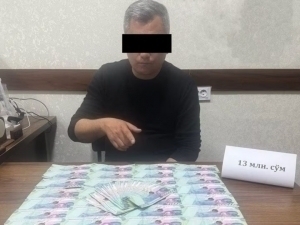From dismissal to district: Unfinished journey of Nizomiddinov
Review
−
08 April 2025 22388 6 minutes
Although not officially confirmed, Zaynilobiddin Nizomiddinov — who was reportedly dismissed from his role as head of the Presidential Administration following the protests in Karakalpakstan — has now become the mayor of the Bekabad district in the Tashkent region. Today, we explore whether taking on the role of district mayor after heading the Presidential Administration constitutes a promotion or a demotion.
Nizomiddinov’s Dismissal and Reappointment
According to the press service of the Tashkent regional government, an extraordinary session of the Council of People's Deputies of Bekabad district was held on April 7. During the session, the former head of the Presidential Administration was appointed as the new mayor of the district. His predecessor, Shukhrat Begimqulovich Dostbekov, was dismissed due to “mistakes” in his work.
It was reported that Zaynilobiddin Nizomiddinov — who had been serving as First Deputy Chairman of the Council of the Federation of Trade Unions of Uzbekistan after leaving his presidential post — was personally recommended for the mayoral role by the governor of the Tashkent region, Zoir Mirzayev. However, the reasons behind Nizomiddinov’s nomination remain unclear.
Why Did Nizomiddinov Leave the Presidential Administration?
Born in 1974 in the Sariosiyo district of Surkhandarya region, Zaynilobiddin Shahobiddinovich Nizomiddinov held various government positions, including head of the Secretariat of the Agro-Industrial Complex under the Cabinet of Ministers, and later, head of the executive apparatus within the Presidential Administration.
Following the reorganization of the presidential office into the Presidential Administration in August 2018, Nizomiddinov, then serving as an advisor, was appointed as its head. Opinions about his leadership varied: some regarded him as unknown, while others described him as strict.
On July 8, 2022, President Shavkat Mirziyoyev dismissed Nizomiddinov from his post via presidential decree. Officially, his removal was attributed to health reasons. However, many speculated that his dismissal was connected to the protests in Karakalpakstan on June 1, 2022, even though this has never been officially acknowledged.
Coincidentally, on the same day of his removal, Nizomiddinov was appointed First Deputy Chairman of the Federation of Trade Unions of Uzbekistan — a position that had not previously existed. After assuming this role, he disappeared from public view. Nearly three years later, the former head of administration re-emerged as mayor.
Why Bekabad?
Many are asking: Why Bekabad? Some consider the Bekabad district a kind of political springboard — either from the top down or from the bottom up to the regional level.
Let’s review some past leaders of Bekabad. In 2017, Turobjon Juraev led the district for just two months. Before that, he had served as Deputy Minister of Finance, Minister of Public Education, and governor of Surkhandarya and Kashkadarya regions. He became mayor of Bekabad in April 2017 and, just three months later, was appointed governor of Samarkand. However, after only a month, he was convicted under several articles of the Criminal Code — including embezzlement and bribery — and sentenced to 13 years in prison. The exact timing of these offenses remains unclear.
Before Jo‘rayev, Otabek Isroilov served as Bekabad mayor until June 20, 2017, having previously been Deputy Governor of Tashkent region for agriculture and water management. He was dismissed a year later for failing to fulfill his duties and falsifying cotton reports.
Following him, Nemat Abdullaev — former mayor of Parkent district — took office in September 2018. In early 2020, the then-governor of Tashkent region, Rustam Kholmatov, criticized Bekabad’s poor performance in areas such as exports, investments, and youth employment and dismissed Abdullaev.
He was succeeded by Furkat Khudoyberdiev, head of the regional finance department, who assumed the role in February 2020. By 2023, Khudoyberdiev too faced criticism and was removed from office.
As noted earlier, Shukhrat Mirzayev, recommended for the mayoral post by Zoir Mirzayev, served as acting governor from August 2023. However, four months later — the day after Agriculture Minister Aziz Voitov’s arrest — he was detained for suspected embezzlement. Previously, he was Deputy Head of the Accounting and Reporting Department at Qishloq Qurilish Bank.
Shukhrat Dostbekov, former chairman of the Tashkent Regional Council of Farmers, Dehkan Farms, and Homestead Owners, briefly succeeded him but was dismissed for errors in his work. He was replaced by Zaynilobiddin Nizomiddinov, who previously held one of the highest-ranking administrative roles in the country.
It is difficult to find a mayor who has consistently served with distinction in Bekabad. Governors at the regional level tend to maintain their positions, while district-level mayors change frequently.
For someone with Nizomiddinov’s experience, managing a district is hardly a challenge. Yet, his path — from leading the Presidential Administration to governing Bekabad — raises questions: Is this a demotion or a strategic return?
In Uzbekistan, being a governor, whether of a district, city, or region, is considered a powerful role. Governors often wield influence over law enforcement and prosecutors — sometimes even interfering in their affairs.
Abdurakhmon Tashanov, chairman of the “Ezgulik” human rights society, describes Nizomiddinov’s appointment as part of a rehabilitation process.
“Zaynilobiddin Nizomiddinov’s appointment as district mayor resembles a rehabilitation effort. Though he once held high-ranking positions, he did not leave them on good terms. He was not appreciated for his work, which is why he might be considered a ‘fallen star.’ The post of district mayor is more of a duty position. But it can also serve as a springboard — one step to a regional governor, and from there to the prime minister or beyond. Uzbekistan’s personnel policy is often confusing and illogical. If a district mayor becomes a minister or deputy prime minister, I wouldn’t be surprised. Promotions often depend not on law or regulations but on traditions and the personal views of those in power. If Nizomiddinov has returned to government, it may signal a brighter future — perhaps a governorship or even restoration to his former post,” said Tashanov.
Are there examples in Uzbekistan of officials falling from high office and rising again? Yes. A notable example is Zoir Mirzayev, current governor of Tashkent region. Between 2016 and 2018, he served as Deputy Prime Minister and Minister of Agriculture and Water Resources. He was dismissed after forcing six workers to jump into a ditch for failing to irrigate wheat on time — an act that drew widespread condemnation.
However, he returned in 2019 as governor of Kashkadarya region and, in 2021, became governor of Tashkent region.
Another example is Shukhrat Ganiev, who governed Fergana region and faced criticism for verbally abusing staff. Despite the President’s public disapproval of his leadership, Ganiev continued to rise through the ranks.
Uzbekistan has seen many officials who were dismissed or criticized, only to be promoted later. Whether Nizomiddinov’s appointment in Bekabad will serve as a stepping stone to greater heights remains to be seen. As the saying goes, time will tell.
Live
All



